Host Program
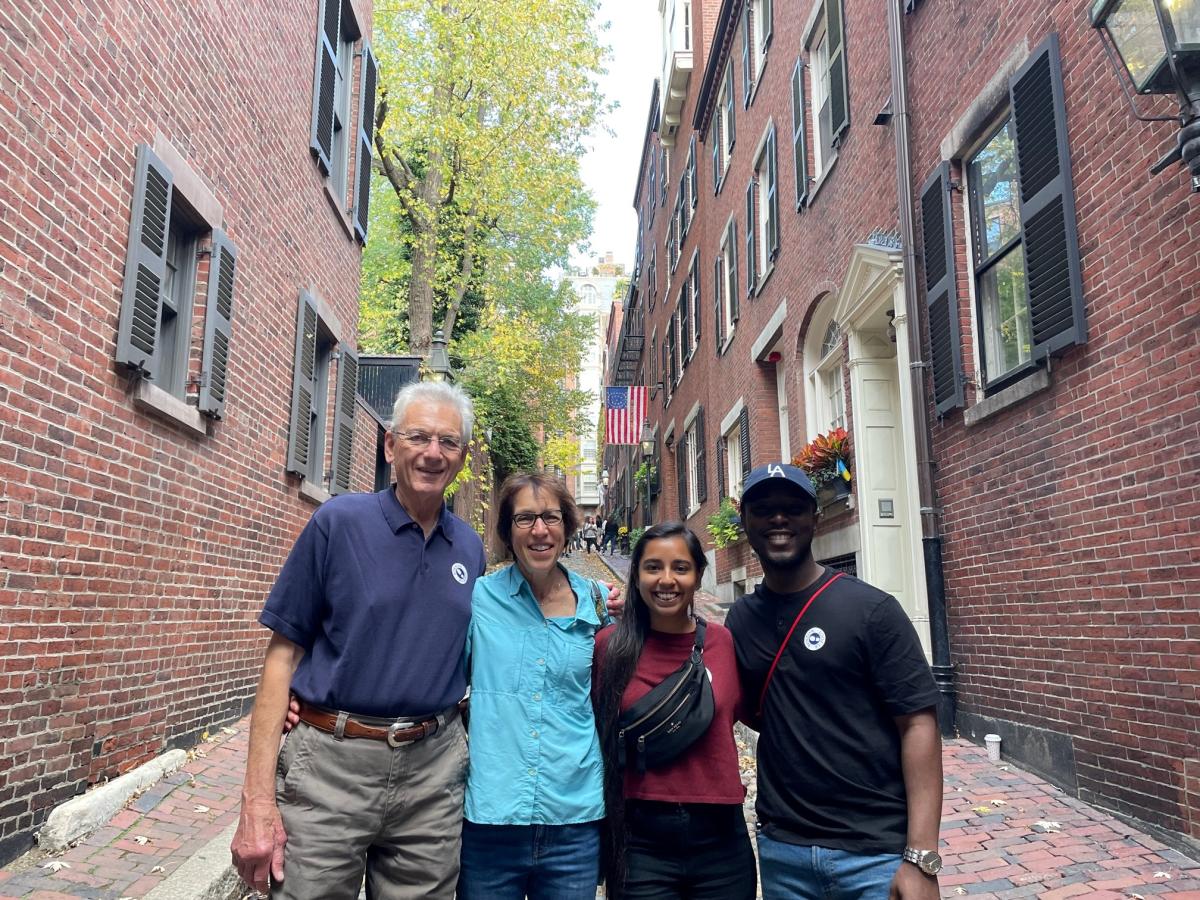 Hosts and students on walking tour of Beacon HillSince 1962 the Host Program has provided an opportunity for connection and friendship between Harvard international graduate students who are new to the United States and residents who live in the Boston area. Hosts in turn benefit from exposure to the wealth of cultures that come from around the world to study here at Harvard.
Hosts and students on walking tour of Beacon HillSince 1962 the Host Program has provided an opportunity for connection and friendship between Harvard international graduate students who are new to the United States and residents who live in the Boston area. Hosts in turn benefit from exposure to the wealth of cultures that come from around the world to study here at Harvard.
We invite prospective students and hosts to read the information below to gain a better understanding of what the Host Program entails. There are also school specific programs throughout Harvard for which students may qualify; check directly with your individual school to see if it has a host program.
FAQ (Frequently Asked Questions)
Who are the students participating in the program?
Priority is given to international graduate students who have never lived in the U.S. before. The overall goal is to match all international graduate students who apply.
How does a student apply?
If you are an international graduate student and would like to apply to the Host Program, please complete the application on our website.
How long does it take to be matched?
Most student applications are received by the end of June. Hosts are contacted regarding potential student matches. The matching process may take time depending on when student applications are received, the feedback from potential hosts, and the hosts' summer vacation schedules. We attempt to match the majority of students prior to the start of the fall semester.
Are hosts paid?
No, their participation in this program is purely voluntary.
What do hosts do?
Hosts connect with students in many different ways. They may assist with both the exciting and overwhelming process of settling in and becoming acclimated to new surroundings. While hosts do not provide housing, they may offer occasional meals, interesting outings, stimulating conversations, and holiday celebrations. We also encourage students to invite their hosts to university events, to meet for a chat, to prepare a dish from their country, etc. In addition, the Host Program organizes a few informal activities during the year where hosts and students can come together.
What activities do hosts do with students?
 A host and student kayaking togetherHosts may invite students to participate in activities that they (the hosts) enjoy doing as well as introduce students to the local area and culture. In addition, hosts may discover some interesting activities that the students enjoy doing back home and would like to continue doing here in the U.S. or new activities students would like to try.
A host and student kayaking togetherHosts may invite students to participate in activities that they (the hosts) enjoy doing as well as introduce students to the local area and culture. In addition, hosts may discover some interesting activities that the students enjoy doing back home and would like to continue doing here in the U.S. or new activities students would like to try.
Who are the hosts?
Hosts are Boston area residents who come from many different backgrounds. They vary in age and may be single, couples, or families with children. Many hosts have Harvard affiliations (Harvard alumni, employees, retirees), but a Harvard affiliation is not required to be a host for this program.
What makes a match successful?
Each student-host pairing is unique. It is the students and their hosts who create the elements of a mutually rewarding friendship. In many cases the friendship lasts years beyond the student's time at Harvard!
How much time is required of hosts?
There is no set requirement for how much time hosts should spend with their students. It will depend on the hosts' and students' schedules. More time will likely be spent at the beginning of the student's program and during the fall semester. As the academic year progresses, students become more occupied and may have less time to meet.
Can a host have more than one student?
Yes! The number of student applications usually outweighs the number of available hosts. Some hosts have found that hosting two (or more) students is actually easier. If they are from different countries, interesting conversations can occur when comparing cultures and experiences.
What are the financial expectations of hosting?
Hosting should not be a costly endeavor; shared activities and events do not need to be elaborate/expensive. Hosts should communicate with their students regarding payment expectations for any activities or outings (e.g. museum passes, concert tickets, etc.). Managing expectations is important to avoid confusion and misunderstandings.
Since the hosting obligation is for one year, how do hosts handle students who are here for a longer period?
Students are aware that the program is for one year. It is wonderful if a strong friendship develops during that year. However, the Host Program coordinator will be hoping that hosts are still available to host a new student for the following academic year. Sometimes the hosts will invite their former student(s) to activities and events to help a new student.
Are there activities where the program gathers as a whole?
The Host Program organizes a few informal activities during the year where hosts and students can come together as a group. Students are welcome to attend these activities without their hosts and vice versa.
Apply to Become a Host
Be part of a group of special people who help make Harvard a friendlier place for newly arrived international graduate students. By participating in the Host Program for International Students, you will join a group of hundreds of volunteers who have enriched the lives of thousands of graduate students, and, in turn, found their own lives enriched. A relatively small effort can reap big rewards. Hosting is a way in which one person can make a difference!
Contact:
Renee Burke
Programming Coordinator, Harvard International Office
Guidelines for Hosts
Expectations of Hosts
The immediate post-arrival time is when students need and enjoy their host’s attention the most. The knowledge, support, and kindness that you can offer as a host is highly appreciated by students during their initial settling-in period. Once classes begin, students become more immersed in their studies and need less support. However, hosts are expected to stay in touch with students during the year. The amount of time spent together is up to the hosts and students.
Students appreciate the opportunity for a window into life in the United States. Events do not have to be elaborate or costly. The following are several activities to consider:
- Sharing coffee or a meal
- Going to a supermarket/farmer's market/other shopping
- Visiting a museum
- Watching a sports event
- Going for a walk/hike
- Exploring different neighborhoods, towns, etc.
- Celebrating a birthday or holiday
Once Hosts Have Been Matched with Students
An immediate welcoming email message gives new students a real sense of connection. Hosts may want to include information about their family, interests, profession, where they live in relation to the University, and a photo. If for any reason hosts have difficulty contacting their students, please email the Host Program Coordinator, Renee Burke.
Upon a Student's Arrival
Hosts are not expected to meet students at the airport but are encouraged to arrange a first meeting soon after their arrival. The Harvard International Office (HIO) informs students not to expect housing of any kind from their hosts. The students' schools will have sent them housing information. You will find more details on this below.
Immigration Requirements for Students
International students have special obligations to the U.S. government, and it is the role of the HIO to help students meet them. If students have any questions regarding immigration, employment, travel outside the United States, or financial matters, please direct them to the HIO.
Orientation Meetings
Each school within Harvard provides orientations. The HIO offers optional "Getting Started" orientations to international students and spouses/partners as well.
Starting the Academic Year
The beginning of an academic year is a critical time for students. Keep in mind that international students are making many adjustments simultaneously - new living accommodations, unfamiliar food, and new academic systems. What seems instinctive or obvious to locals may not appear so to the students.
Housing
Many students arrive knowing they have University housing - either graduate student dormitories or Harvard-owned apartments. Harvard-affiliated housing will provide instructions to the students as to when and how to get the keys to their accommodations, and they will inform students about what is included in University housing. Most dormitory rooms include basic furniture, but no linens. Harvard-owned apartments are unfurnished except for kitchen appliances.
Furnishings
Furnishing a temporary home can be overwhelming if one doesn't know where to buy the things they need. MIT has opened its MIT Furniture Exchange to Harvard and other local universities. In addition, Harvard's Recycling and Surplus Center offers furniture, household items, textiles, and a wide variety of other donated items for free to anyone on a first-come, first-served basis during their weekly opening hours.
Hosts can share information with students about yard sales, second-hand stores, Craigslist, or local Facebook groups where people are selling furniture and household items. Stores such as Cort Furniture Rental offer rental furniture and sell used furniture, and IKEA sells new furniture at reasonable prices. An offer by hosts to take students shopping is very helpful.
During the Academic Year
Once classes begin, academics become foremost in a student's mind. However, hosts should stay in touch with their students during the year. It is up to the host to initiate contact and extend invitations. Occasional texts, calls, and/or emails provide tremendous encouragement and support for students. Should an invitation be turned down, it probably is due to students’ academic priorities. Don't let refusals dissuade from extending future invitations. Hopefully, students will soon feel comfortable enough to propose ideas for getting together.
Financial Guidelines
The HIO does not expect hosting to be an expensive undertaking for hosts. However, communication is important to clarify expectations. If hosts would like their students to pay for something (e.g. museum passes, concert tickets, etc.), they should explain their expectations of payment in advance. Hosts should not extend loans. Please let the program coordinator know immediately if a student informs you of a financial emergency, and please advise the student to contact their HIO advisor.
Group Activities
We will inform hosts when we are able to organize a group activity for students and hosts during the academic year. Please keep in mind that for all activities organized by the Host Program, the program coordinator only notifies the hosts. The hosts in turn notify their respective students.
- Hosts will receive an invitation via email from the HIO.
- Hosts will contact their students to extend the invitation.
- Students will only know about events from their hosts.
- Hosts or students can attend without the other.
Fall
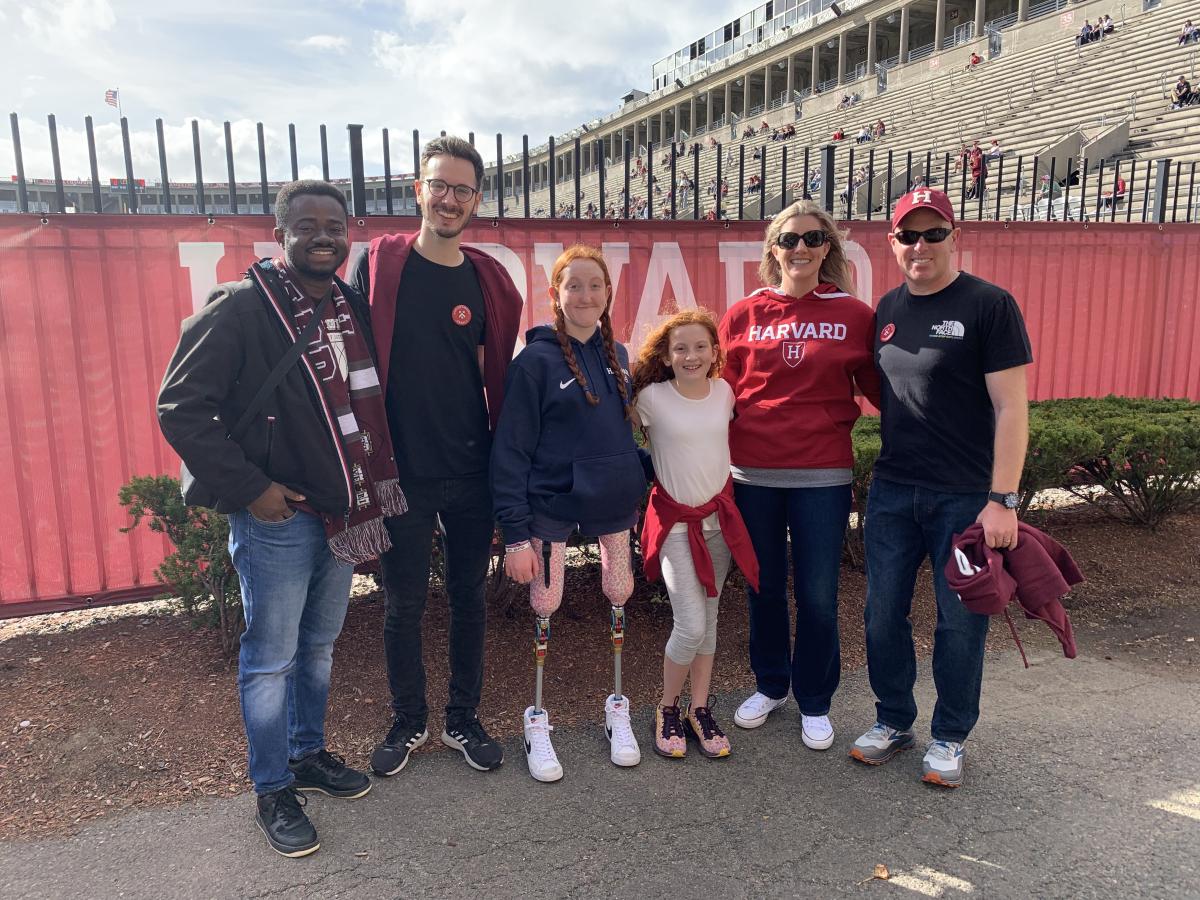 Students and host family at Harvard football gameAutumn in New England is a special time of year that hosts can share with students. Consider an afternoon of apple picking or cider pressing; a trip outside the city or to the Arnold Arboretum for spectacular foliage; a Harvard football game; Halloween trick or treating or a costume party. Students likely will have more time available to spend with hosts in the fall semester than in the spring semester.
Students and host family at Harvard football gameAutumn in New England is a special time of year that hosts can share with students. Consider an afternoon of apple picking or cider pressing; a trip outside the city or to the Arnold Arboretum for spectacular foliage; a Harvard football game; Halloween trick or treating or a costume party. Students likely will have more time available to spend with hosts in the fall semester than in the spring semester.
The Holiday Season
 Celebrating Thanksgiving dinnerThe holiday season often presents a dilemma for hosts - flexibility is key! Some hosts love sharing their Thanksgiving, December, or New Year's traditions with students. Others may be traveling or find themselves wondering how to include non-family guests. For the students, this can be a time to travel or to catch up on academic work. Most international students, however, are curious about American holiday customs. Everyone has their own traditions, but giving thanks and sharing gifts seem to be universal. What better way to celebrate than providing students with a window into your own holiday world!
Celebrating Thanksgiving dinnerThe holiday season often presents a dilemma for hosts - flexibility is key! Some hosts love sharing their Thanksgiving, December, or New Year's traditions with students. Others may be traveling or find themselves wondering how to include non-family guests. For the students, this can be a time to travel or to catch up on academic work. Most international students, however, are curious about American holiday customs. Everyone has their own traditions, but giving thanks and sharing gifts seem to be universal. What better way to celebrate than providing students with a window into your own holiday world!
Outings to Consider
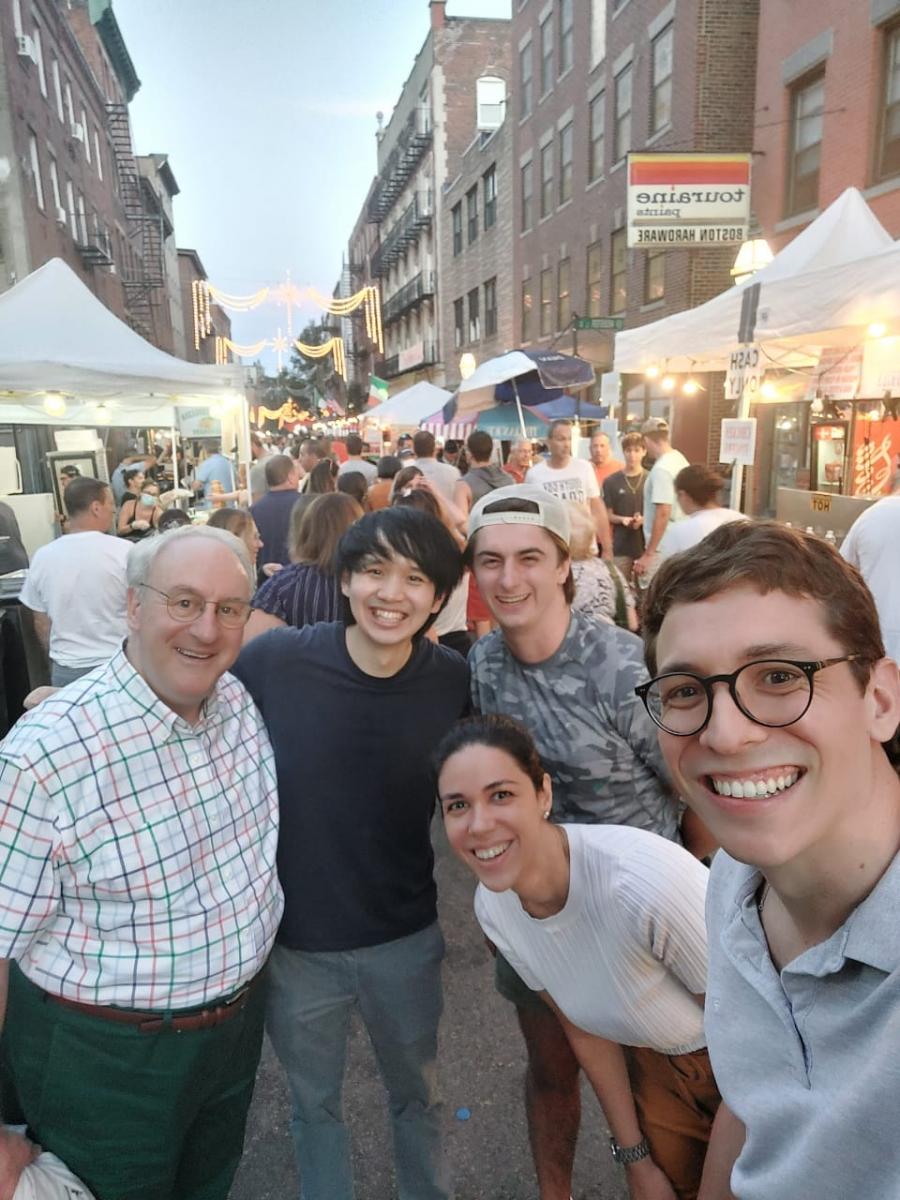 A host and students visiting Fisherman's Feast in Boston's North EndEncourage students to voice their interests and likes and dislikes. Hosts should be upfront about how much tickets cost if they would like students to pay.
A host and students visiting Fisherman's Feast in Boston's North EndEncourage students to voice their interests and likes and dislikes. Hosts should be upfront about how much tickets cost if they would like students to pay.
Some favorites:
- Boston area events
- Boston Marathon
- Concord
- Freedom Trail
- Harvard athletic events
- John F. Kennedy Library
- Lexington
- Old Sturbridge Village
- Salem
- Arnold Arboretum
- Blue Hills Reservation
- Dept. of Conservation and Recreation
- Whale Watching
Personal Celebrations
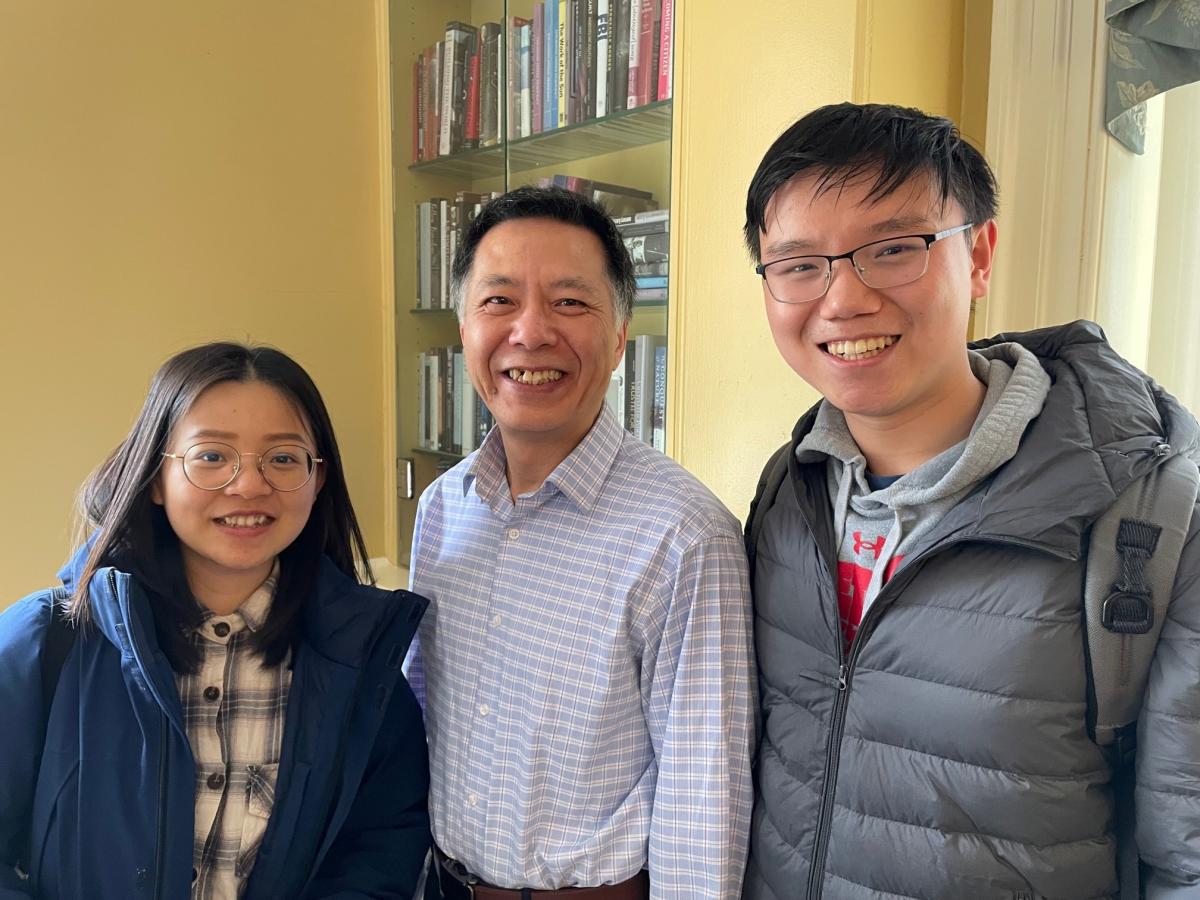 Host and students at spring luncheonStudents will feel honored to be included in a host's celebrations of life's milestones - a birthday, wedding, retirement, or similar event. Allowing students to share a part of the host's life is a great gift. Students have told us they enjoy participating in family events!
Host and students at spring luncheonStudents will feel honored to be included in a host's celebrations of life's milestones - a birthday, wedding, retirement, or similar event. Allowing students to share a part of the host's life is a great gift. Students have told us they enjoy participating in family events!
Commencement
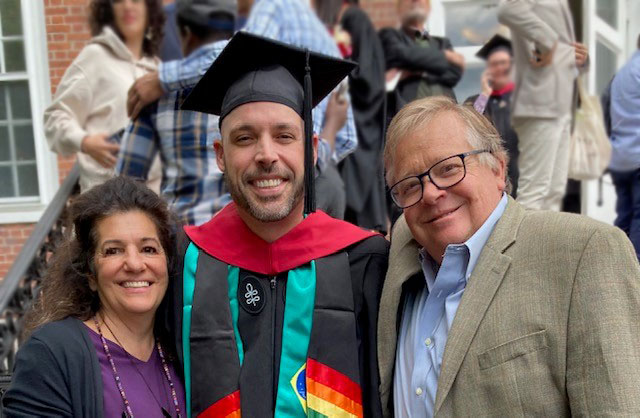 Hosts and student at CommencementStudents may want to share it with their hosts as it gives the hosts the opportunity to celebrate their student's academic achievement. If the student's family is coming for Commencement, hosts might offer to help with housing arrangements for the family. Students will probably want their family to meet their hosts — their local family.
Hosts and student at CommencementStudents may want to share it with their hosts as it gives the hosts the opportunity to celebrate their student's academic achievement. If the student's family is coming for Commencement, hosts might offer to help with housing arrangements for the family. Students will probably want their family to meet their hosts — their local family.
About Commencement Day
- Graduate students are usually given only two tickets to the morning exercises in Harvard Yard, Tercentenary Theatre (between Widener Library and Memorial Chapel). It is difficult to find additional tickets for this event and and access to Harvard Yard is restricted. However, the event is live-streamed and viewing areas are set up in other parts of the campus.
- Students return to their respective schools to receive their diplomas in another ceremony and have lunch. Tickets are required for the prepaid lunch.
Our hosts became our friends and support in times of need. We were blessed to be hosted by them. It was a great match and we know this is a beginning of a long term relationship. The bridge was built between Zimbabwe and the U.S."
